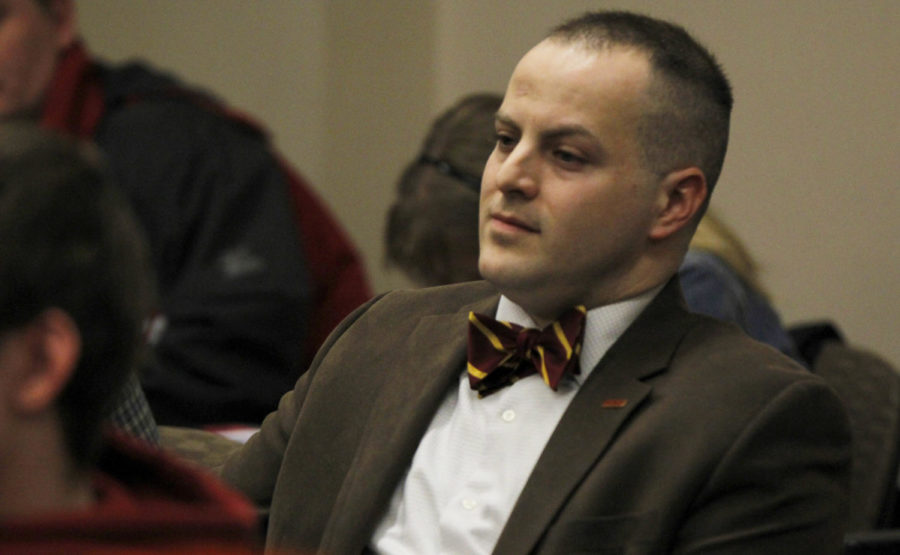Attempted GSB censure fails, viewed as ‘personal’
Jonathan Krueger/Iowa State Daily
Barry Snell was present at a GSB court hearing on February 26, 2014 in the Gerdin Building.
February 28, 2014
Shocked faces filled the room during Wednesday’s Government of the Student Body meeting, as a proposed measure by Sen. Peter Benzoni attempted to “censure” Barry Snell, GSB vice speaker.
“No communication was established,” said Sen. Zach Bauer, public relations chairman. “You could tell the expression on everyone’s face, most of the people had no idea what was going on.”
A censure is a formal expression of disapproval. Unlike no-confidence motions, censures merely express disapproval without resulting in a direct removal from office, though this can vary from system to system. In some systems, censures can even be brought to the floor — with a chairperson’s, i.e., the vice president’s, approval — without appearing on the official agenda. They can also be voted on, though this typically requires a supermajority in order to pass.
The censure, which was headed by Benzoni and Sen. Hamad Abbas, cited four main points:
• Snell’s presidential campaign
• The suit against Adam Guenther, election commissioner
• A failure to fully execute his duties according to the bylaws
• “Bullying” tactics
“I actually really respect Barry,” Benzoni explained. “I just didn’t feel that he was acting in such a way befit of Speaker.”
The pro-censure group’s primary argument focused on Snell’s presidential campaign, feeling that his suit against Guenther and his “smear campaign” against Khayree Fitten, fellow presidential candidate, put GSB in a negative light.
Those who argued against the censure felt that there was a separation between Snell’s actions as a presidential candidate and as vice speaker. They felt that both the lawsuit and the campaign were not issues that needed to be brought to the Senate.
Bauer felt that Snell had not broken any bylaws substantial enough to warrant a censure or removal from office. Bauer agreed that Snell’s actions during the campaign and his duties as vice speaker were separate.
“He did absolutely nothing unethical, and GSB can’t censure people for speaking their opinions,” Bauer said. “You can’t take away people’s ability to speak freely or campaign for whatever reason they want.”
Snell argued that, as a student, he was justified in his actions during the campaign. Snell declined an interview but did make the following statement.
“I think the comments made by senators voicing their support for me and their repudiation of Mr. Benzoni’s actions, plus the overwhelming majority vote defeating his motion and vindicating me by default, says all that needs to be said,” Snell said.
Snell said he did not fully understand what Benzoni’s motivations behind the proposition were. However, other senators did comment, saying that they didn’t feel the censure was in any way politically motivated, but was rather personal.
“To be honest, I think this shows that everybody involved cares about the organization,” said Gabby Williams, speaker of the senate. “They want to hold each other accountable.”
Benzoni also commented on his reasons for the censure, admitting that he wasn’t proud of having to be so harsh and political in the approach but did feel the censure was a reasonable course of action.
Everyone interviewed did agree that there needed to be better communication among GSB members.
“What ultimately came out of that discussion is that we need to have better communication outside of our meetings,” said Hillary Kletscher, vice president. “That’s something I want to focus on over the next few weeks personally, to encourage people to talk to each other. If you have a problem with someone, talk to them.”

















